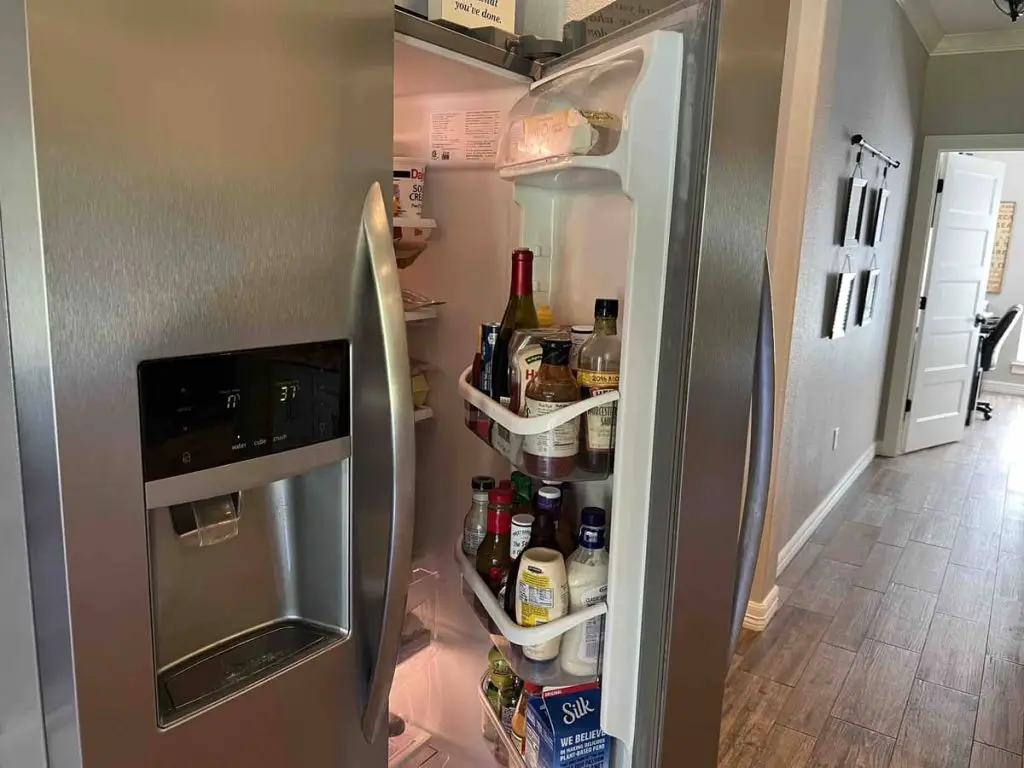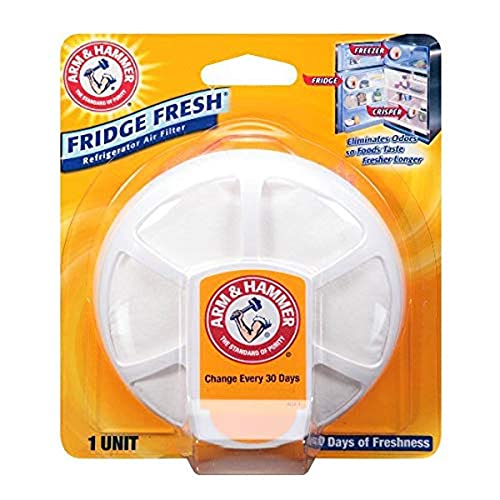Refrigerators use chemical refrigerants to achieve low temperatures and keep food, beverages, and other things cool. If your fridge has developed a strange chemical odor, then a number of factors may have caused it. It’s important to identify and rectify the problem, as some cases can be hazardous to your health or the environment.
Your refrigerator may smell like chemicals due to harsh cleaners, leaking refrigerant, rotting food, old ice, or outgassing. It’s essential to address these problems right away to prevent them from contaminating the food in your refrigerator.
Keep reading for details on the different things that cause chemical smells in refrigerators, as well as what to do if your refrigerator smells like chemicals.

Your Refrigerator May Be Leaking Refrigerant!
If your fridge smells like ammonia, gasoline, or other chemicals, the appliance could be leaking refrigerant. This issue can potentially be a health risk, so it’s important to contact a professional to get to the root of the problem and get it fixed.
Several other things could cause a chemical smell in your refrigerator. These include:
- Harsh cleaners. If you use powerful cleaning products to clean your fridge frequently, these chemicals may have seeped into the plastic components inside the fridge.
- Leaking refrigerant. If the smell isn’t coming from the cleaning products you use for your fridge, you may have a refrigerant leak. This issue is more common in older refrigerators and requires a licensed technician to repair it.
- Rotting food. Some foods can create chemical-like smells when they decay. Removing the offending foods can quickly rectify this.
- Old ice. If ice or frost is building up in your freezer, it can sometimes absorb odors, such as those from chemicals used to clean the fridge.
- Outgassing. Brand new fridges sometimes smell of chemicals from the plastics and other materials used in them. Giving the fridge some time to air out can help resolve this issue.
Most of these issues are not particularly concerning. Typically, odors can be rectified by either cleaning out the offending substance or switching to a less intense cleaning product. However, if the smell of nail polish or ammonia persists without any apparent cause, then a refrigerant leak could be the problem.
If the fridge has trouble with cooling, this is another sign that the appliance could be leaking chemicals. Most of the chemicals used in fridges these days are less harmful than they used to be, but it’s still a cause for concern. In most cases, it’s inadvisable to attempt to repair the leak yourself.
In addition, if you decide to dispose of your refrigerator, it’s important to do so correctly. Most countries have laws about disposing of appliances that contain refrigerant chemicals, such as freon or hydrofluorocarbons. These chemicals are harmful to the environment and hazardous to human health in many cases.
Contacting a professional appliance disposal service is the easiest way to dispose of an old, unused refrigerator. However, if you want to address your odor problem without chucking your fridge, keep scrolling to read how to fix the funk.
Get a Professional Technician To Inspect Your Refrigerator
Sometimes, getting rid of a chemical smell in your fridge is a simple process.
You should remove any rotten food or old ice if the odor is coming from them. Then, removing the offending substance and cleaning it with some light cleaner should be enough.
Likewise, if your fridge is new, and the smell is coming from the plastic and other substances in the new fridge, then all you should have to do is air it out for a little while.
However, if there’s a persistent chemical smell even after you have tried cleaning and outgassing the fridge, then you could have a refrigerant leak. This issue is more common in older fridges since the wear and tear of use may have degraded the evaporating coils that contain the refrigerant. If the chemical smell is particularly strong coming from a localized area in the fridge, then the leak is likely around that area.
Fixing the leak yourself is not recommended for a few reasons. Firstly, the chemical refrigerant in the coils could potentially damage your skin, eyes, or other parts of your body if it comes into contact with you. Secondly, attempting to repair the fridge yourself could void your warranty and may even be illegal depending on where you live.
A professional technician can identify the cause of the smell and even repair the damage in many cases. If there has been significant leakage, they’ll have to replace the refrigerant inside the appliance. The sale of such refrigerants is typically restricted to anybody except licensed professionals.
Freon Leak in a Refrigerator Smells Like Nail Polish
Although new fridges no longer use actual freon, some older fridges still use it. Freon is more hazardous than the various refrigerants used in newer fridges and has a strong chemical odor similar to nail polish.
Other refrigerants are less harmful but must still be handled properly. These will also have a chemical smell that varies between nail polish and other chemical substances such as gasoline or ammonia.
Sometimes, a refrigerant leak can cause a musty odor akin to rotting food. It’s particularly true if your fridge is kept in an enclosed space. If you can’t identify the source of the smell, then the fridge may be leaking refrigerant.
According to Universal Appliance Repair, there are five ways you can tell if your fridge is leaking freon or other refrigerants:
- The refrigerator fails to keep food cool.
- The compressor on the fridge cycles more frequently than usual.
- Your energy bill is unexpectedly high.
- There are strange odors around the refrigerator.
- People in your household experiencing unexplained illnesses.
Final Thoughts
Leaking refrigerant is the most concerning cause of a refrigerator smelling like chemicals. This issue is more common with older fridges still using freon, but it can still happen with newer refrigerants.
Recommended Reading:
- Complete Kitchen Cleaning Guide
- Green Cleaning: 6 Natural Cleaning Products That Won’t Harm You Or The Environment
Declutter your home once and for all (Even if you have no time and don't know where to begin)! Learn More.



